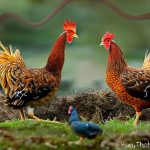Keeping ducks and chickens together can be a rewarding experience for poultry enthusiasts. Both species are popular choices for backyard farming and can complement each other in various ways. Ducks excel at foraging and have a natural affinity for water, while chickens are adept at scratching and pecking for insects.
Combining these species can create a diverse flock that provides eggs and meat while also contributing to pest control and soil fertility. When integrating ducks and chickens, it is crucial to understand their differences, create an appropriate living environment, provide proper nutrition, and manage their social dynamics. Health and safety considerations are also essential to ensure the well-being of both species.
This article will explore various aspects of keeping ducks and chickens together, including species differences, suitable living environments, feeding and nutrition, health and safety considerations, social dynamics management, and tips for creating a harmonious flock.
Table of Contents
- 1 Understanding the Differences Between Ducks and Chickens
- 2 Creating a Suitable Living Environment for Ducks and Chickens
- 3 Feeding and Nutrition for Ducks and Chickens
- 4 Health and Safety Considerations for Ducks and Chickens
- 5 Managing Social Dynamics Between Ducks and Chickens
- 6 Tips for Integrating Ducks and Chickens into a Harmonious Flock
- 7 FAQs
- 7.1 Can ducks and chickens be kept together?
- 7.2 What are the considerations for keeping ducks and chickens together?
- 7.3 What are the housing requirements for ducks and chickens kept together?
- 7.4 What do ducks and chickens eat?
- 7.5 Are there any health concerns when keeping ducks and chickens together?
- 7.6 Do ducks and chickens get along?
Key Takeaways
- Ducks and chickens can be kept together, but it’s important to understand their differences and create a suitable living environment for both species.
- Ducks and chickens have different dietary needs, so it’s important to provide appropriate feed and nutrition for each species.
- Health and safety considerations, such as protecting against predators and providing proper veterinary care, are essential for keeping ducks and chickens healthy.
- Managing social dynamics between ducks and chickens requires understanding their natural behaviors and providing enough space for both species to coexist peacefully.
- Tips for integrating ducks and chickens into a harmonious flock include introducing them at a young age, providing multiple food and water sources, and monitoring their interactions closely.
Understanding the Differences Between Ducks and Chickens
Physical Characteristics
Ducks are waterfowl and are naturally drawn to water, while chickens are ground-dwelling birds that prefer dry land. Ducks have webbed feet that make them excellent swimmers, while chickens have clawed feet that are adapted for scratching and pecking at the ground. Additionally, ducks have an oil gland near their tail that they use to preen their feathers and make them waterproof, while chickens do not have this adaptation.
Behavioral Differences
In terms of behavior, ducks are generally more independent and less likely to form a strict pecking order compared to chickens. They are also known for their calm and docile nature, making them less prone to aggression towards other birds.
Chickens, on the other hand, are more social animals and tend to establish a clear pecking order within their flock. They can be territorial and may exhibit aggressive behavior towards other birds, especially during the integration process.
Coexistence and Care
Understanding these differences is crucial when keeping ducks and chickens together to ensure that their unique needs and behaviors are met.
Creating a Suitable Living Environment for Ducks and Chickens
When keeping ducks and chickens together, it’s essential to provide a suitable living environment that meets the needs of both species. Ducks require access to water for swimming, preening, and foraging, while chickens need a dry and well-ventilated coop with nesting boxes for laying eggs. To accommodate both species, consider setting up a coop with a fenced outdoor area that includes a small pond or shallow water source for the ducks.
This allows ducks to engage in their natural behaviors while providing chickens with a dry area to scratch and peck. The coop should be spacious enough to accommodate both ducks and chickens comfortably, with separate areas for nesting, roosting, and feeding. It’s important to provide adequate ventilation to prevent moisture buildup, as ducks are more susceptible to respiratory issues in damp environments.
Additionally, the coop should be predator-proof to protect both ducks and chickens from potential threats such as foxes, raccoons, and birds of prey. By creating a suitable living environment that meets the specific needs of both species, you can ensure the health and well-being of your mixed flock.
Feeding and Nutrition for Ducks and Chickens
Feeding ducks and chickens together requires careful consideration of their dietary needs and preferences. Ducks are omnivores with a diet that consists of insects, aquatic plants, grass, and commercial poultry feed. They also require access to water for drinking and foraging.
Chickens are also omnivores but have different dietary requirements compared to ducks. They need a balanced diet of grains, seeds, insects, and commercial poultry feed, along with access to grit for digestion. When feeding ducks and chickens together, it’s important to provide a balanced diet that meets the nutritional needs of both species.
This can be achieved by offering a combination of poultry feed formulated for ducks and chickens, along with access to forage such as grass, weeds, and insects. Additionally, providing supplemental treats such as mealworms, fruits, and vegetables can help enrich their diet and provide essential nutrients. It’s important to monitor their food intake to ensure that each bird is getting enough nutrition without overeating or competing for food.
Water is also an essential component of their diet, especially for ducks. They require access to clean water for drinking and bathing, which is crucial for maintaining healthy feathers and overall well-being. When providing water for ducks and chickens, consider using separate containers to prevent contamination from droppings or feed.
By carefully managing their feeding and nutrition, you can promote the health and vitality of your mixed flock.
Health and Safety Considerations for Ducks and Chickens
Maintaining the health and safety of ducks and chickens requires proactive measures to prevent disease, parasites, and injuries. Ducks are generally hardy birds but can be susceptible to respiratory issues if exposed to damp or poorly ventilated environments. Chickens are prone to various health issues such as respiratory infections, mites, lice, and internal parasites.
When keeping ducks and chickens together, it’s important to monitor their health regularly and provide appropriate veterinary care when needed. To prevent disease transmission between ducks and chickens, practice good biosecurity measures such as quarantining new birds before introducing them to the existing flock. Keep their living environment clean by regularly removing droppings, providing fresh bedding, and disinfecting feeders and waterers.
Additionally, provide regular access to dust baths for chickens to help control external parasites such as mites and lice. Predator-proofing the coop and outdoor area is essential for protecting ducks and chickens from potential threats. Use sturdy fencing with buried wire mesh to prevent digging predators such as foxes and install secure latches on coop doors to deter raccoons and other nocturnal predators.
Consider using motion-activated lights or alarms to scare off predators during the night. By prioritizing the health and safety of your mixed flock, you can create a secure environment where ducks and chickens can thrive.

Establishing a Peaceful Coexistence
Chickens are known for establishing a pecking order within their flock, which can lead to aggression towards new or unfamiliar birds. When integrating ducks into an existing chicken flock or vice versa, it’s important to monitor their interactions closely to prevent bullying or injuries.
Facilitating a Smooth Transition
Ducks are generally more laid-back and less likely to engage in aggressive behavior compared to chickens. However, they may still face challenges when integrating into an established chicken flock. To facilitate a smooth transition, consider introducing ducks and chickens in a neutral territory outside of the coop or run. This allows them to interact without territorial disputes and gives them an opportunity to establish a hierarchy without confinement.
Reducing Stress and Competition
Provide multiple feeding stations and water sources to prevent competition between ducks and chickens during meal times. This helps reduce stress and minimizes the risk of aggressive behavior towards each other. Additionally, observe their interactions regularly to ensure that all birds have access to food, water, and resting areas without being bullied or excluded from essential resources.
Tips for Integrating Ducks and Chickens into a Harmonious Flock
Integrating ducks and chickens into a harmonious flock requires patience, observation, and proactive management. When introducing new birds into an existing flock or combining different age groups, consider using temporary barriers such as wire partitions or crates to allow visual contact without physical interaction. This helps familiarize them with each other’s presence before full integration.
Monitor their interactions closely during the integration process and be prepared to intervene if aggressive behavior occurs. Provide hiding spots such as shrubs or shelters within the outdoor area to give birds a chance to escape from potential conflicts. Additionally, consider adding enrichment activities such as hanging treats or toys to keep them occupied and reduce boredom.
Gradually increase the amount of time that ducks and chickens spend together until they become accustomed to each other’s presence. Be mindful of individual personalities within the flock and make adjustments as needed to ensure that each bird feels safe and comfortable. With time and careful management, ducks and chickens can coexist peacefully in a harmonious flock where they can thrive together.
In conclusion, keeping ducks and chickens together can be a rewarding experience that offers numerous benefits in terms of pest control, soil fertility, egg production, and meat supply. By understanding the differences between ducks and chickens, creating a suitable living environment, providing proper nutrition, prioritizing health and safety considerations, managing social dynamics, and implementing integration tips, you can successfully maintain a harmonious mixed flock. With careful planning and proactive management, you can create an environment where ducks and chickens can thrive together in a balanced ecosystem that benefits both species.
If you’re interested in learning more about how to keep ducks and chickens together, you may also want to check out this article on creating a garden chicken coop here. It provides valuable information on how to design a coop that is suitable for both ducks and chickens, ensuring they can live together harmoniously.
FAQs
Can ducks and chickens be kept together?
Yes, ducks and chickens can be kept together in the same coop and run, as long as certain considerations are taken into account.
What are the considerations for keeping ducks and chickens together?
When keeping ducks and chickens together, it’s important to provide enough space for both species, as ducks and chickens have different space and housing requirements. Additionally, it’s important to consider the dietary needs of both ducks and chickens, as they have different nutritional requirements.
What are the housing requirements for ducks and chickens kept together?
The housing for ducks and chickens kept together should provide enough space for both species to move around comfortably. Additionally, the housing should have separate nesting areas for ducks and chickens, as they have different nesting habits.
What do ducks and chickens eat?
Ducks and chickens have different dietary needs. Chickens typically eat a diet of grains and seeds, while ducks require a diet that includes access to water for foraging and eating aquatic plants and insects.
Are there any health concerns when keeping ducks and chickens together?
One potential health concern when keeping ducks and chickens together is the risk of disease transmission between the two species. It’s important to monitor the health of both ducks and chickens and practice good biosecurity measures to prevent the spread of disease.
Do ducks and chickens get along?
In general, ducks and chickens can get along well when kept together, especially if they are raised together from a young age. However, it’s important to monitor their interactions and provide enough space and resources to prevent any potential conflicts.
Meet Walter, the feathered-friend fanatic of Florida! Nestled in the sunshine state, Walter struts through life with his feathered companions, clucking his way to happiness. With a coop that’s fancier than a five-star hotel, he’s the Don Juan of the chicken world. When he’s not teaching his hens to do the cha-cha, you’ll find him in a heated debate with his prized rooster, Sir Clucks-a-Lot. Walter’s poultry passion is no yolk; he’s the sunny-side-up guy you never knew you needed in your flock of friends!







